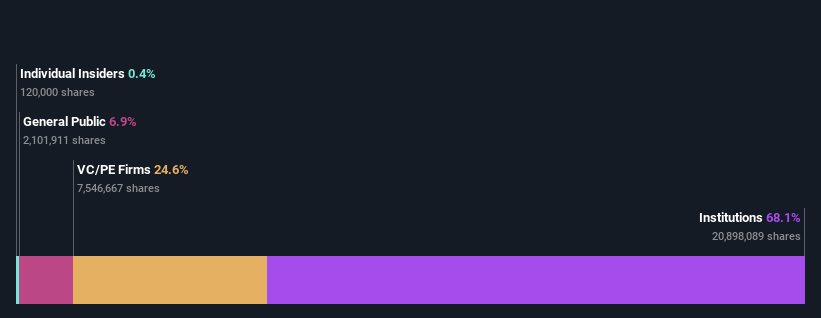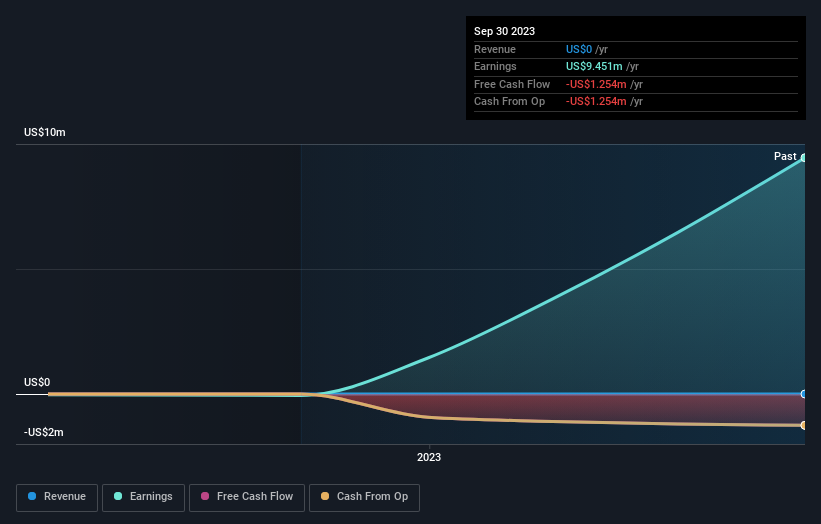With 68% ownership, Spring Valley Acquisition Corp. II (NASDAQ:SVII) boasts of strong institutional backing
Key Insights
Given the large stake in the stock by institutions, Spring Valley Acquisition II's stock price might be vulnerable to their trading decisions
A total of 8 investors have a majority stake in the company with 51% ownership
Past performance of a company along with ownership data serve to give a strong idea about prospects for a business
To get a sense of who is truly in control of Spring Valley Acquisition Corp. II (NASDAQ:SVII), it is important to understand the ownership structure of the business. We can see that institutions own the lion's share in the company with 68% ownership. That is, the group stands to benefit the most if the stock rises (or lose the most if there is a downturn).
Given the vast amount of money and research capacities at their disposal, institutional ownership tends to carry a lot of weight, especially with individual investors. As a result, a sizeable amount of institutional money invested in a firm is generally viewed as a positive attribute.
Let's take a closer look to see what the different types of shareholders can tell us about Spring Valley Acquisition II.
See our latest analysis for Spring Valley Acquisition II
What Does The Institutional Ownership Tell Us About Spring Valley Acquisition II?
Institutions typically measure themselves against a benchmark when reporting to their own investors, so they often become more enthusiastic about a stock once it's included in a major index. We would expect most companies to have some institutions on the register, especially if they are growing.
Spring Valley Acquisition II already has institutions on the share registry. Indeed, they own a respectable stake in the company. This suggests some credibility amongst professional investors. But we can't rely on that fact alone since institutions make bad investments sometimes, just like everyone does. When multiple institutions own a stock, there's always a risk that they are in a 'crowded trade'. When such a trade goes wrong, multiple parties may compete to sell stock fast. This risk is higher in a company without a history of growth. You can see Spring Valley Acquisition II's historic earnings and revenue below, but keep in mind there's always more to the story.
Institutional investors own over 50% of the company, so together than can probably strongly influence board decisions. We note that hedge funds don't have a meaningful investment in Spring Valley Acquisition II. Pearl Energy Investments is currently the largest shareholder, with 25% of shares outstanding. With 6.9% and 4.0% of the shares outstanding respectively, First Trust Capital Management L.P. and Aristeia Capital, LLC are the second and third largest shareholders.
On further inspection, we found that more than half the company's shares are owned by the top 8 shareholders, suggesting that the interests of the larger shareholders are balanced out to an extent by the smaller ones.
While it makes sense to study institutional ownership data for a company, it also makes sense to study analyst sentiments to know which way the wind is blowing. We're not picking up on any analyst coverage of the stock at the moment, so the company is unlikely to be widely held.
Insider Ownership Of Spring Valley Acquisition II
The definition of company insiders can be subjective and does vary between jurisdictions. Our data reflects individual insiders, capturing board members at the very least. Management ultimately answers to the board. However, it is not uncommon for managers to be executive board members, especially if they are a founder or the CEO.
Most consider insider ownership a positive because it can indicate the board is well aligned with other shareholders. However, on some occasions too much power is concentrated within this group.
Our data suggests that insiders own under 1% of Spring Valley Acquisition Corp. II in their own names. It seems the board members have no more than US$834k worth of shares in the US$213m company. Many investors in smaller companies prefer to see the board more heavily invested. You can click here to see if those insiders have been buying or selling.
General Public Ownership
The general public, who are usually individual investors, hold 6.9% stake in Spring Valley Acquisition II, which represents a relatively small class of owners. We would usually expect a higher level of ownership by the general public. With such a small collective position, it may be difficult for small holders to influence the company.
Private Equity Ownership
Private equity firms hold a 25% stake in Spring Valley Acquisition II. This suggests they can be influential in key policy decisions. Some might like this, because private equity are sometimes activists who hold management accountable. But other times, private equity is selling out, having taking the company public.
Next Steps:
I find it very interesting to look at who exactly owns a company. But to truly gain insight, we need to consider other information, too. To that end, you should be aware of the 2 warning signs we've spotted with Spring Valley Acquisition II .
Of course this may not be the best stock to buy. So take a peek at this free free list of interesting companies.
NB: Figures in this article are calculated using data from the last twelve months, which refer to the 12-month period ending on the last date of the month the financial statement is dated. This may not be consistent with full year annual report figures.
Have feedback on this article? Concerned about the content? Get in touch with us directly. Alternatively, email editorial-team (at) simplywallst.com.
This article by Simply Wall St is general in nature. We provide commentary based on historical data and analyst forecasts only using an unbiased methodology and our articles are not intended to be financial advice. It does not constitute a recommendation to buy or sell any stock, and does not take account of your objectives, or your financial situation. We aim to bring you long-term focused analysis driven by fundamental data. Note that our analysis may not factor in the latest price-sensitive company announcements or qualitative material. Simply Wall St has no position in any stocks mentioned.

 Yahoo Finance
Yahoo Finance 

